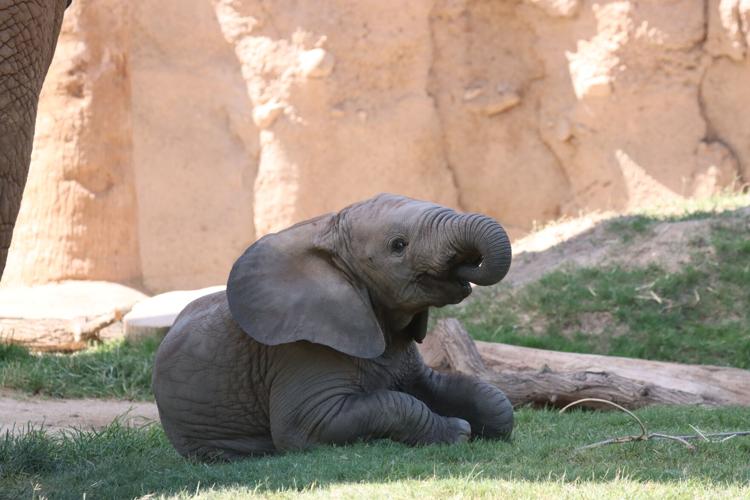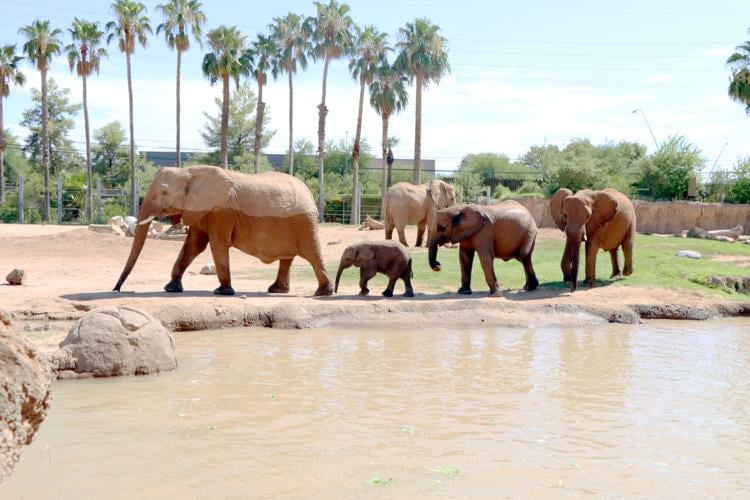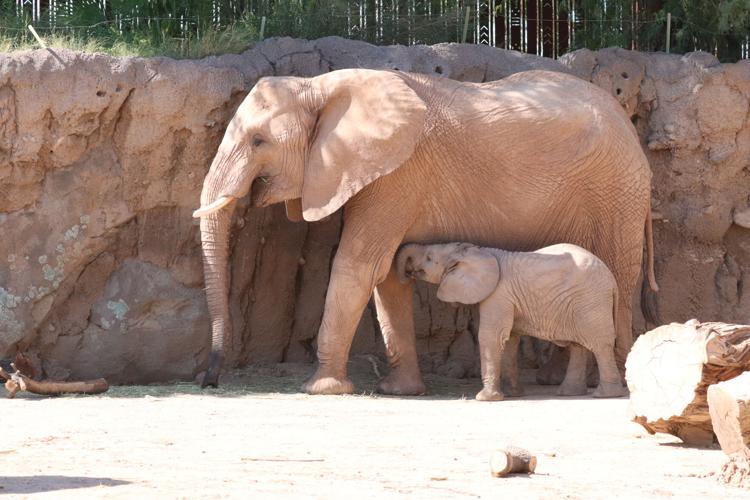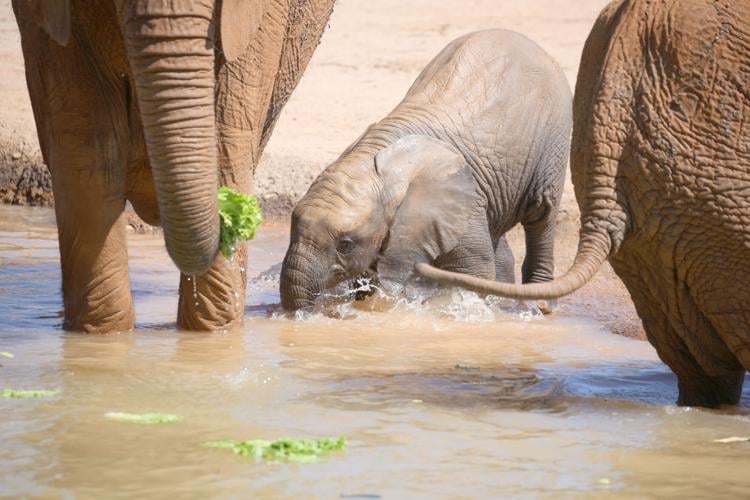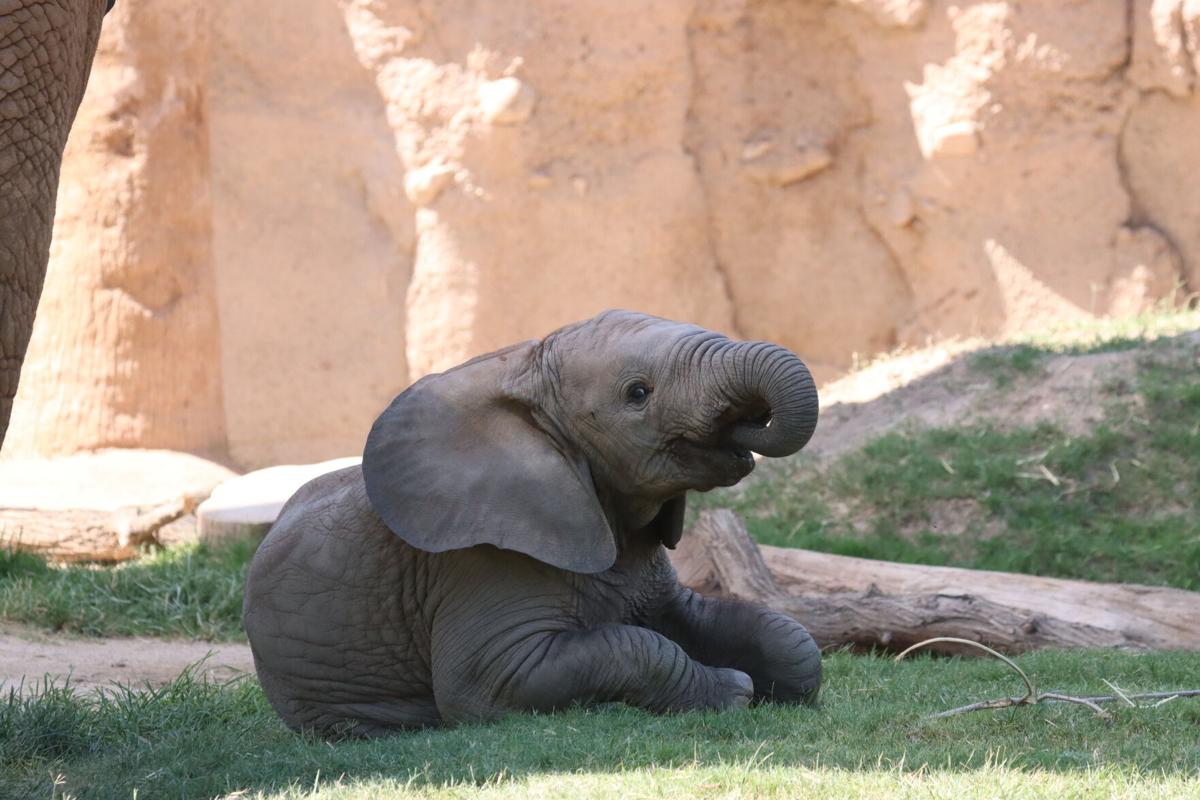Since she was merely a week old, Meru has been in love with water.
The 6-month-old elephant plays with the hose, flops in the mud wallows and uses her trunk to suck water from the palms of her zoo staff’s hands.
For the first time since Meru was born, staff filled the habitat’s pool all the way to the top, where the deepest part is 10 to 11 feet.
"Elephant Meru made a huge splash for her first time in the pool this past week. At six months old, the youngest elephant of the herd practiced using her trunk to splash around with the herd," Reid Park Zoo wrote on Facebook.
“We monitored her for a week and we invited the ellies in and she started to swim right away and jumped right in,” says Reid Park Zoo elephant care specialist Mara Eisenbarth. “We could see her actively doggy paddling.”
“Meru has been showing more interest in being more bold and trying new things,” Eisenbarth says.
Meru was born on March 8 at Reid Park Zoo, 3400 E. Zoo Court, to African elephant Semba. The 655-pound elephant calf joined allomother Lungile and big sisters Nandi and Penzi.

Reid Park Zoo staff filled the elephant habitat pool all the way to the top and 6-month-old Meru got in for the first time.
“We talked with a lot of different institutions to see where the elephant community is on when they typically fill their pool for their little ones because Nandi was pretty interested in swimming early on. I wasn’t here, but from what I hear, she was pretty interested but maybe not as much as Meru,” Eisenbarth says. “Penzi didn’t go in until her second birthday party, so she waited two years. (With Penzi,) we waited a little while for her before filling the pool up and then we realized she wouldn’t go in it anyway so we just filled it up.”
Now 4 years old, Penzi loves the pool — so much so that she’s known to completely submerge herself in the water. Sometimes you don’t even know she’s there, which is exactly what Meru learned when she was swimming with her sisters recently. She accidentally swam right on top of Penzi, not realizing her big sister was under the water. Initially startled, the result was a few cute trumpets.
Even when they aren’t trumpeting, elephants are social animals, excellent at communicating with one another.
“You can tell when Meru gets a little deeper (in the pool) than where she can stand,” Eisenbarth says. “They let her play around for a while, but then there’s body language or silent communication when they decide playtime is over. They all turn around and get out of the pool — and Meru will get out with them. She’s very good at following directions like that.”

Meru loves water, whether it’s splashing in the pool or flopping around in the mud wallows.
Swimming and flopping around in the mud wallows are Meru’s favorite things to do, both of which she’s been doing more with her sisters and Lungile. Semba isn’t a big fan of mud.
“Meru is very curious and she’s also very social,” Eisenbarth says. “She tends to be independent to an extent, but she does pretty much always seek out one of her sisters and Lungile, like she’ll see them if she has an itch she needs to scratch on her ear, she’ll rub against their legs. They’re all really patient with her.”
Meru has pretty much mastered her trunk at this point, no longer face planting into food as much. Her favorite snacks at the moment are diced fruits and veggies — they have to be diced, though. She doesn’t like them in large chunks or pureed.

At 6 months old, Meru's favorite foods are diced fruits and veggies.
Last month, Meru was learning to stay still in the event of blood draws — a skill she’s gotten down pat. Now she’s working with her trainers on cueing her ears, which is when staff will tap her ear and say “ear.” Eventually, she should feel and hear that cue and stick out her ear. Blood draws typically happen in the ear because it’s the thinnest part of an elephant’s body and the easiest area to see the vein.
A blood draw may take the assistance of three people — trainers and whoever is drawing the blood — depending on the elephant. For example, some elephants’ may have ears with smaller veins so a second person might be needed to hold the ear for more support. Staff are working to get Meru familiar with having three people around, just in case.

All five of Reid Park Zoo’s elephants are pictured here.
“We have the trainer working with her and maybe somebody else is by her hips, giving her scratches. We plan for more in case we need more,” Eisenbarth says. “(All the elephants) react really differently to different ways of training. We always say there’s a million ways to train the behavior.”
Training sessions are voluntary for the elephants at Reid Park Zoo and done through positive reinforcement. Training allows staff to check on the health and well-being of the elephants.

Although Meru still stays close to mom Semba, she's been spending lots of time with allomother Lungile and sisters Nandi and Penzi.
Meru is also learning to come when her name is called — though she might not fully know her name yet. She might be trotting along simply because she hears some kind of call, not necessarily because it’s her name.
“When Semba gets called, she knows it’s a package deal,” Eisenbarth says. “She has always had a lot of personality but she plays really hard these days and she sleeps really hard, too.”
In one case recently, staff were trying to do a training session with Semba and they called Meru’s name. The calf was asleep in the barn and the most they could get out of her was a tiny ear wiggle.
“She was in dreamland,” Eisenbarth says.

Meru has expressed interest in other foods that the other elephants are eating, but she'll likely continue to nurse for another couple years.


